When buying eggs at the supermarket, you will find a dizzying array of choices. You have to choose from caged, cage-free, free-range, pasture-raised, organic, Certified Humane, and more. How do you decide which eggs to buy? Is it “bad” to just go for the cheapest ones? Do you pick something on the middle end price-wise and hope for the best? Or do you splurge and go for the most expensive eggs, assuming that they come from the happiest hens?
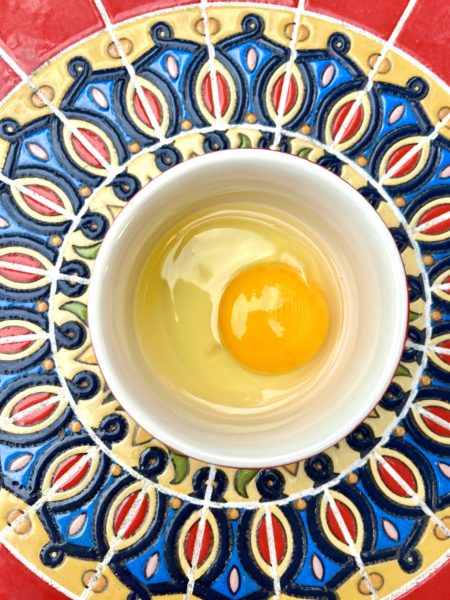
The answer is, in two parts, both simple and complicated. Part one: You have to know the terms and what it means for the hens and eggs. But even if you understand the definitions, there is still a great variety among how various farms treat their hens. That leads to Part Two: It helps to get to know your farmers. That’s the only way you can know for sure what happens to your egg before it gets to your table.
Buying Eggs: Definitions
As to Part One, here’s, a brief explanation: Under the Certified Humane program certifications, Cage Free means that the hens must not live in cages but they do not have to be outside. Free Range means they must have access to the outdoors at least 6 hours per day. There must also be at least two square feet of outdoor space per bird. Pasture Raised means they must be placed on a pasture at least six hours per day. There must also be 108 square feet of outdoor space per bird.
Certified organic eggs means that the hens have eaten only organic feed, and it is not a measure of animal welfare specifically. (Note that all hens/eggs are hormone free by law. The eggs you eat are antibiotic-free as well. A hen would only receive antibiotics if it was sick, and then farmers would remove her from the laying rotation.)
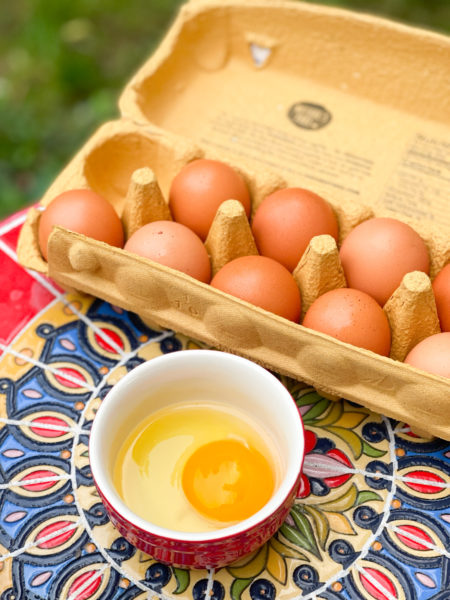
With that said, those are simply the minimum standards, and there can be great variations from farm to farm. Egg brands may vary in terms of the size of the farm, the size of the outdoor space, and the amount of time hens actually spend outside.
Nature’s Yoke Eggs
That leads us to Part Two, which is getting to know your farmers better. To learn more about egg farming, we headed out to New Holland, PA, to Westfield Egg Farm, home of the Nature’s Yoke and Utopihen egg brands.

New Holland is in the heart of Pennsylvania Dutch country in rural central Pennsylvania, where many Amish, Mennonite, and Anabaptist families have owned farms for more than a century. The Westfield/Nature’s Yoke/Utopihen business that we visited is now in its fourth generation. As George Weaver IV, the great-grandson of the founder told us, “We know eggs.”
(One worker that we met at the egg farm has worked there for more than 50 years. He remembers when George Weaver III, the current CEO, was born.)
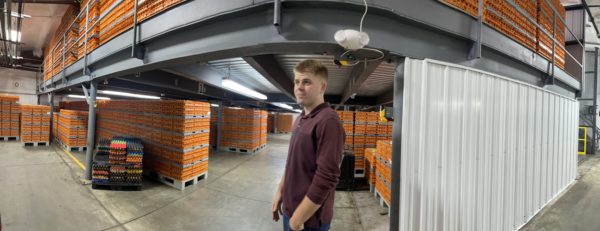
George Weaver IV stands in a warehouse surrounded by eggs
Among their egg brands, Nature’s Yoke eggs are free-range and Utopihen eggs are pasture-raised. We chose to look closer at the Nature’s Yoke free-range eggs. At a lower price point, they seemed to fit the profile of what most thoughtful but budget-conscious families would choose.
Nature’s Yoke eggs come from 25 small, family-owned farms, all within a 2 1/2-hour range of New Holland.
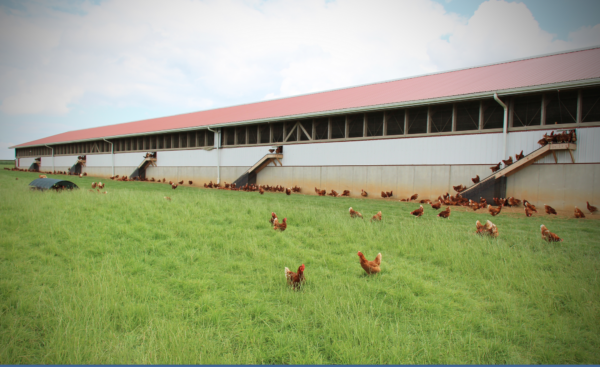
Photo via Nature’s Yoke
Additionally, each Nature’s Yoke farm is family-owned, which means that Nature’s Yoke does not own the farm or the hens. Of course, there are required standards for each farmer to meet. But the family-owned model gives the farmers more independence and control over how they operate and manage their farms.
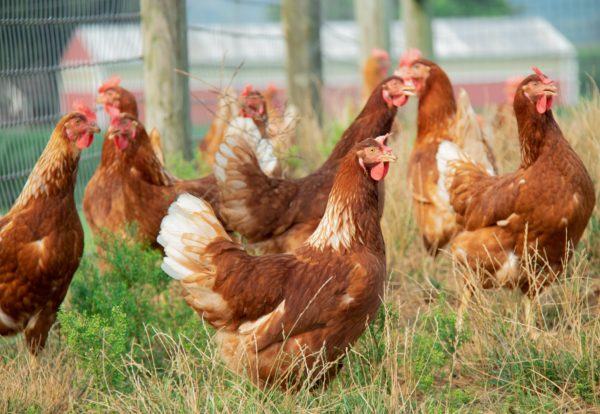
Photo via Nature’s Yoke
The Journey from Farm to Carton
While at the headquarters for Nature’s Yoke, we had a chance to watch the eggs go on a journey from just-laid to ready-to-go-to-market.
The eggs (90 to 95 percent of which are brown eggs) arrive at the processing facility within a week of being laid. When first laid, the eggs have a natural protective coating that keeps them fresh without being refrigerated. But once they arrive at the processing facility, machines wash and clean them of any debris. Once the eggs lose that protective layer, they need to stay chilled.
Aside from cleaning, eggs go through several processes for sorting and packing. A “blood detector” scans the eggs for any sign of blood spots. (This does not indicate a baby chick is in development, as none of Nature’s Yoke eggs are fertilized. Blood spots, as uncommon as they are, come from the hen during the laying process.) A sound wave machine checks the
eggs for any cracks. Additional machines scan the eggs for any dirt or debris, and then sort them by size. If blood, cracks or dirt are detected they will not move on to be sold in your grocery store or local market.
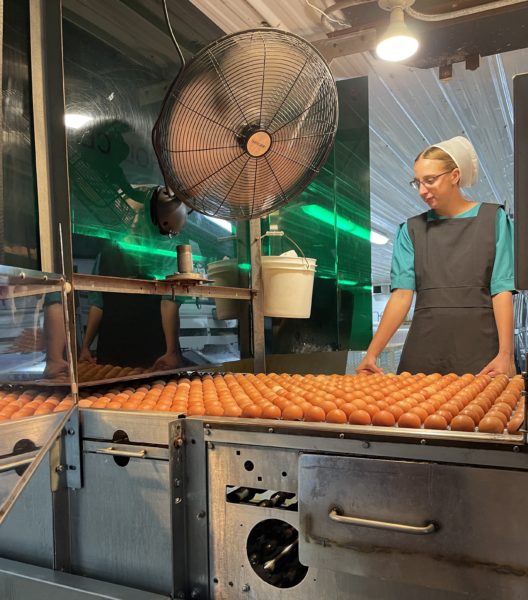
A series of workers give the eggs visual checks throughout the process. Then they seal up the cartons and store the cartons in boxes. The eggs sit in giant refrigerated rooms for no more than one to two weeks before they head out for shipping to your local store.
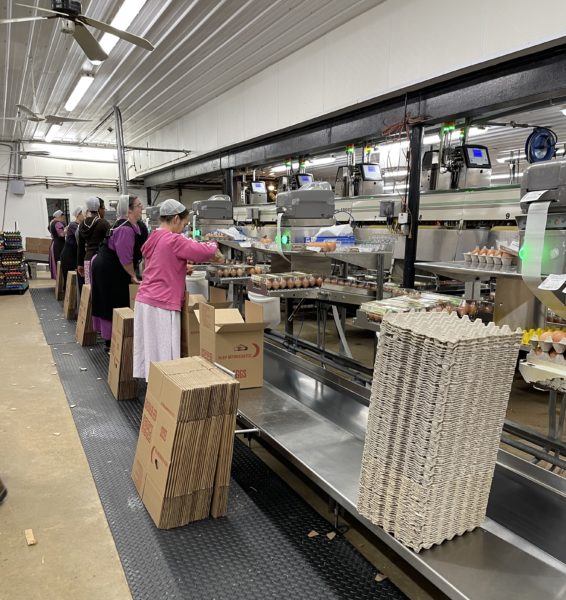
Buying Nature’s Yoke Eggs
Two other things worth noting about Nature’s Yoke eggs: One, the company places a high priority on sustainability. They use planet-friendly biodegradable cartons, and they have a commitment to carbon neutrality. They are also active in community tree-planting and regenerative agriculture efforts.
Two, they are based in the U.S. and are farmer-owned. They are not backed by foreign investment or equity investors, or by any Wall Street conglomerate.
While they are expanding west, Nature’s Yoke eggs are currently available east of Ohio along the east coast, from Maine to Florida, with a heavy concentration of sales in New York and the New England states. You can purchase them through Acme, Stop & Shop, Giant, Albert’s Fresh Produce, Four Seasons companies, C & S Wholesale Grocers, Gristedes, McCaffrey’s Food Markets, Bozzuto’s Inc., Mom’s Organic Market, The Fresh Grocer, Earth Fare, J&J Farms Creamery, Met Food Markets, Foodtown, UNFI, Giant Martins, Associated Food Stores, Rainforest Distribution, and King Kullen, as well as many other regional and local grocery stores and local family markets.
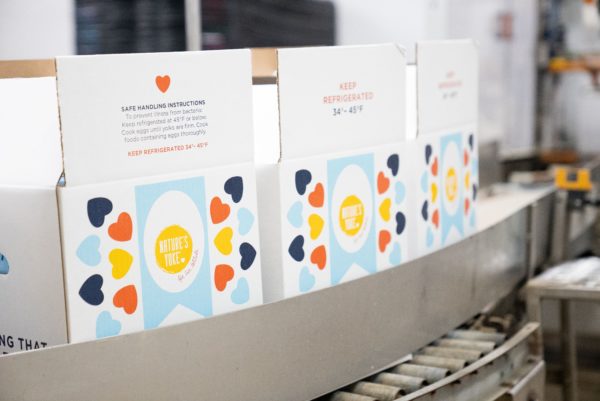
Photo via Nature’s Yoke
When purchasing a Nature’s Yoke dozen, you can choose from three varieties of free range eggs: Legacy Free Range, Organic Free Range, or Omega-3 Free Range. The Legacy Free Range eggs are the traditional free-range eggs. The Organic Free Range eggs come from hens that have been fed a strictly organic non-GMO diet. And last, the Omega-3 Free Range eggs come from hens with added flax in their diet to boost the Omega-3 levels in the eggs.
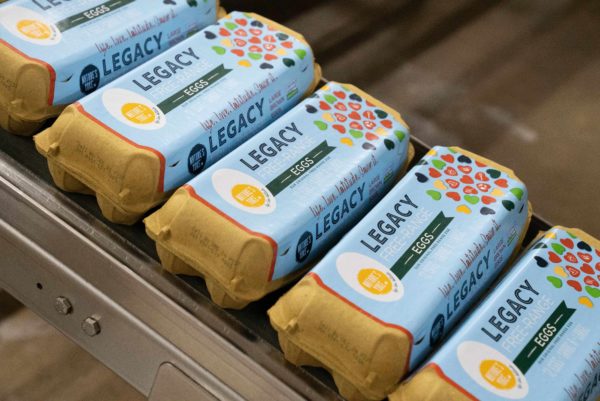
Photo via Nature’s Yoke
All three varieties are equally fresh and flavorful – and of course, they all have that cheery bright-orange yolk.
Asking More Of Your Egg Company
Now that we know more about Nature’s Yoke eggs, we feel comfortable eating them – and recommending them highly to friends and family.
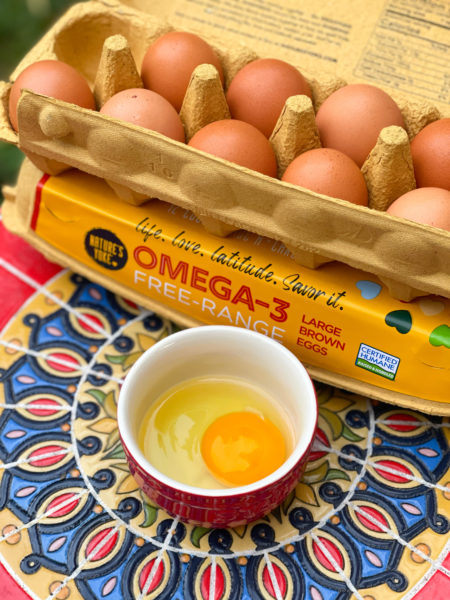
Nature’s Yoke Omega-3 eggs
However, we realize that not everyone has access to these exact eggs (if you do, lucky you!). And we realize that not everyone is going to tour an egg farm to make their egg-shopping decisions.
Yet knowing about the highest standards in the business can give you a good yardstick with which to measure your own eggs. Do the farmers treat the hens well? Does the company treat the farmers well? Would you feel comfortable eating these eggs knowing the conditions on the farm?
If your egg company can pass that test, you can feel good about that company AND about feeding your family with those eggs.
And when it’s time to eat these eggs, please consider some of our favorite egg-centric recipes. You can feature them in a Tomato-Pesto Frittata. They could also be a stand-out feature in your Vegetarian Timpano. Or have them bring a pretty golden hue to your White Asparagus Tart.
Bonus photo: Our brother’s dog trying to figure out why we’re taking pictures of eggs instead of feeding him:

Thank you to Nature’s Yoke for the farm tour and for the egg education. We hope you will expand to the West Coast soon!
Blogger disclosure: The Jolly Tomato visited Nature’s Yoke at our own expense. We did not receive compensation for this visit. All opinions expressed are our own.

 Hi! I'm Jeanne Fratello - a writer, reporter, and food enthusiast who is on a mission to write great stories about food and where your food comes from.
Hi! I'm Jeanne Fratello - a writer, reporter, and food enthusiast who is on a mission to write great stories about food and where your food comes from.
No comments yet.